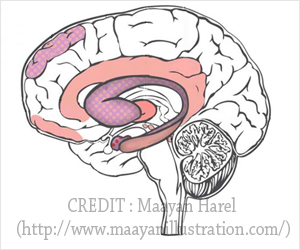Children of depressed mothers tend to have a poorer verbal IQ score, till the age of 16 than children whose mothers are not depressed.
- Cognitive development of children who grow up with depressed mothers is affected till they are 16 years old
- Depression is a mood disorder; mothers who have given birth suffer from post-partum depression
- Maternal depression has to be recognized and treated early on to help both the mother and the growing child
The findings of the study are published in the April issue of Child Development.
Study
The study was conducted on 900 healthy children and their mothers living in Santiago, Chile. The children were periodically assessed at five-year intervals of ages 1, 5, 10 and 16, with the age limit of 16 years.Parameters used to study the mothers during this period were -
- Symptoms of depression throughout the study period by answering a questionnaire that had questions like “Are you sad?” and “Do you find yourself crying?” (At least half of the mothers were sure that they were depressed)
- How affectionate and responsive the mothers were to their children at each age period
- How many age-appropriate learning materials the mothers provided their children
"We found that mothers who were highly depressed didn’t invest emotionally or in providing learning materials to support their child, such as toys and books, as much as mothers who were not depressed. This, in turn, impacted the child’s IQ at ages 1, 5, 10 and 16," said Patricia East, PhD, a research scientist with the Department of Pediatrics at UC San Diego School of Medicine. "The consistency and longevity of these results speak to the enduring effect that depression has on a mother’s parenting and her child’s development."
Results of the study
- The average verbal IQ score for all children at the age of 5 in the study was 7.64 on a scale of one to 19
- The average verbal IQ score of kids with severely depressed mothers was 7.30 compared to 7.78 in children without depressed mothers
- Even though the difference between 7.78 to 7.30 is seemingly small, it is highly meaningful regarding verbal skills and vocabulary
- The study shows that there can be long-term consequences in a child due to chronic maternal depression
- Had only nine years of education
- Were not employed outside the home
- Often lived with extended family in small, crowded homes
What do the results mean?
Maternal depression has to be identified early so that proper intervention and treatment are provided early on.Providing such resources will help them manage their symptoms in a productive way and ensure their children reach their full potential.
The study authors propose further analyzing the current study data to see how mothers’ depression affects children’s depressive symptoms, academic achievement and health like being overweight or obese through childhood and adolescence.
Depression
Depression is a common but severe mood disorder that affects one in ten mothers in the United States. It can affect the way a person feels, thinks, and handles daily activities, like sleeping, eating, or working. If these symptoms have been bothering a person for at least two weeks, they could be diagnosed with depression.There are women who undergo postpartum depression after giving birth; this kind of depression is much more serious than the “baby blues” symptoms of mild depression and anxiety that typically clear within two weeks after delivery.
Some women with postpartum depression experience full-blown major depression either during pregnancy or after delivery. The depression can last for the first six months after childbirth or longer. Approximately, twenty percent of mothers who are severely depressed when their child turns age 1 remain depressed for a long time.
They are overwhelmed with feelings of extreme sadness, anxiety, and exhaustion that accompany the depression; this may make it difficult for them to complete daily care activities for themselves and for their babies.
References:
- Depression - (https://www.nimh.nih.gov/health/topics/depression/index.shtml)
















